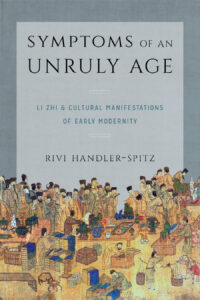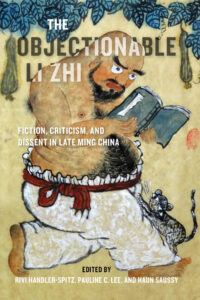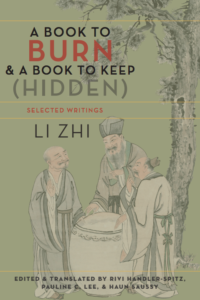My scholarship focuses on Li Zhi (1527-1602), an early modern Chinese intellectual provocateur whose iconoclastic interpretations of history, religion, literature, and social relations exhibit clashing strands of Confucian, Buddhist, and Daoist thought. A biting critic of corruption and hypocrisy, he was ultimately arrested for heresy and his writings were banned by the Ming state. Yet long after his suicide in prison, his books continued to circulate widely, fascinating readers for generations. I approach Li Zhi from a broadly interdisciplinary and intercultural perspective that emphasizes connections between Li Zhi’s writings by works by his best-known European contemporaries, including Montaigne, Cervantes, and Rabelais.
Books
Symptoms of an Unruly Age: Li Zhi and Cultures of Early Modernity
University of Washington Press, 2017
by Rivi Handler-Spitz
Full text available here.
This book compares writings by Li Zhi and his late-Ming dynasty compatriots to texts composed by their European contemporaries including Montaigne, Shakespeare, and Cervantes. Emphasizing aesthetic patterns that transcend national boundaries, this book explores culturally distinct responses to similar social and economic tensions affecting early modern cultures on both ends of Eurasia. The book argues that the paradoxes, ironies, and self-contradictions pervasive in these writings are symptomatic of the hypocrisy, social posturing, and counterfeiting that afflicted Chinese and European societies at the turn of the seventeenth century. Symptoms of an Unruly Age shows us that these texts, although produced thousands of miles away from one another, each manifest commonalities characteristic of the early modern period. Learn more.
The Objectionable Li Zhi: Fiction, Criticism, and Dissent in Late Ming China
University of Washington Press, 2021
Edited by Rivi Handler-Spitz, Pauline C. Lee, and Haun Saussy
Full text available here.
The iconoclastic scholar Li Zhi was a central figure in the cultural world of the late Ming dynasty. His controversial words and actions shaped print culture, literary practice, attitudes toward gender, and perspectives on Buddhism and the afterlife. Although banned, his writings were never fully suppressed, because they tapped into issues of vital significance to generations of readers. His incisive remarks, along with the emotional and rhetorical intensity with which he delivered them, made him an icon of his cultural moment and an emblem of early modern Chinese dissent. The contributors to this volume each approach his work from a different discipline. Together, they demonstrate the far-reaching impact of his thought on his contemporaries and successors. Contributors include: Wai-yee Li (Harvard University), Maram Epstein (University of Oregon), Martin Huang (University of California, Irvine), Timothy Brook (University of British Columbia), Rivi Handler-Spitz (Macalester College), Ying Zhang (Ohio State University), Pauline C. Lee (Saint Louis University), Kai-Wing Chow (University of Illinois, Urbana-Champaign), Jiang Wu (University of Arizona), Robert Hegel (Washington University), and Miaw-fen Lü (Academia Sinica). Learn more.
A Book to Burn and A Book to Keep (Hidden): Selected Writings by Li Zhi
Columbia University Press, 2016
Translated and Edited by Rivi Handler-Spitz, Pauline C. Lee, and Haun Saussy
This volume represents the first book-length English translation of writings by Li Zhi. In his two best-known tomes, A Book to Burn and A Book to Keep (Hidden), Li Zhi uses essays, letters, poems, treatises, and historical jottings to challenge established doctrines, overturn accepted ideas about gender, question the identity of history’s heroes and villains, and offer up his own devastatingly original interpretations of Confucius, Laozi, and the Buddha. Li Zhi’s stinging social critiques praised individuals who risked everything to expose extortion and misrule. The translations in this book point to a history of political dissent in China dating back to the sixteenth century. Learn more.
Selected Scholarly Essays, Articles, Book Chapters
“His Master’s Voice? His Own Voice? Identification, Interpretation, and the Affordances of Yulu Dialogue” in Suyoung Son, Pieter Keulemans and Ariel Fox, eds. The Sensorium of Early Modern Chinese Text. Ithaca: Cornell University Press, forthcoming 2025.
“Savage Script: How Chinese Writing Became Barbaric.” In Global Anti-Asian Racism. Edited by Jennifer Ho. New York: Columbia University Press, 2024.
“Absent Teacher: Present Reader: Narrative, Dialogue, and Fragment in Yuan Zhongdao’s Zuolin jitan.” Forthcoming in T’oung Pao in 2024.
“Ming and Qing Occasional Prose: Letters and Funeral Inscriptions.” In How to Read Chinese Prose, A Guided Anthology, edited by Zong-qi Cai, 331–55. New York: Columbia University Press, 2022.
“Affiliation and Differentiation: Li Zhi as Teacher and Student.” The Objectionable Li Zhi: Fiction, Criticism, and Dissent in Ming China. Edited by Rivi Handler-Spitz, Pauline C. Lee, and Haun Saussy. University of Washington Press, 2021: 92-110.
“Seeking Truth and Exposing Falsehood in Early Modern Prose Collections or Seeing Faces in Pansies.” Journal for Early Modern Cultural Studies 17.2 (Spring, 2017).
“Collaborator or Cannibal? Montaigne’s Role in Lin Yutang’s Importance of Living” in Qian Suoqiao, ed. The Cross-Cultural Legacy of Lin Yutang: Critical Perspectives. Berkeley: University of California Press, 2015: 143-161.
“Provocative Texts: Li Zhi, Montaigne, and the Promotion of Critical Judgment in Early Modern Readers.” Chinese Literature: Essays Articles Reviews 35. (Dec, 2013).
“Short Prose Forms in a Global Sixteenth Century Context.” Prose Studies 32.1 (Sept, 2010).


